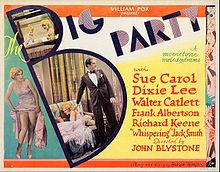This article needs additional citations for verification .(June 2017) |
| The Big Party | |
|---|---|
 Lobby card | |
| Directed by | John G. Blystone |
| Screenplay by | Harlan Thompson |
| Story by | Harlan Thompson |
| Produced by | John G. Blystone |
| Starring | Sue Carol Dixie Lee Walter Catlett Frank Albertson Richard Keene Douglas Gilmore |
| Cinematography | George Schneiderman |
| Edited by | J. Edwin Robbins |
Production company | |
| Distributed by | Fox Film Corporation |
Release date |
|
Running time | 70 minutes |
| Country | United States |
| Language | English |
The Big Party is a 1930 American pre-Code comedy film directed by John G. Blystone and written by Harlan Thompson. The film stars Sue Carol, Dixie Lee, Walter Catlett, Frank Albertson, Richard Keene, and Douglas Gilmore. The film was released on February 23, 1930, by Fox Film Corporation. [1] [2] [3] It is a lost film.